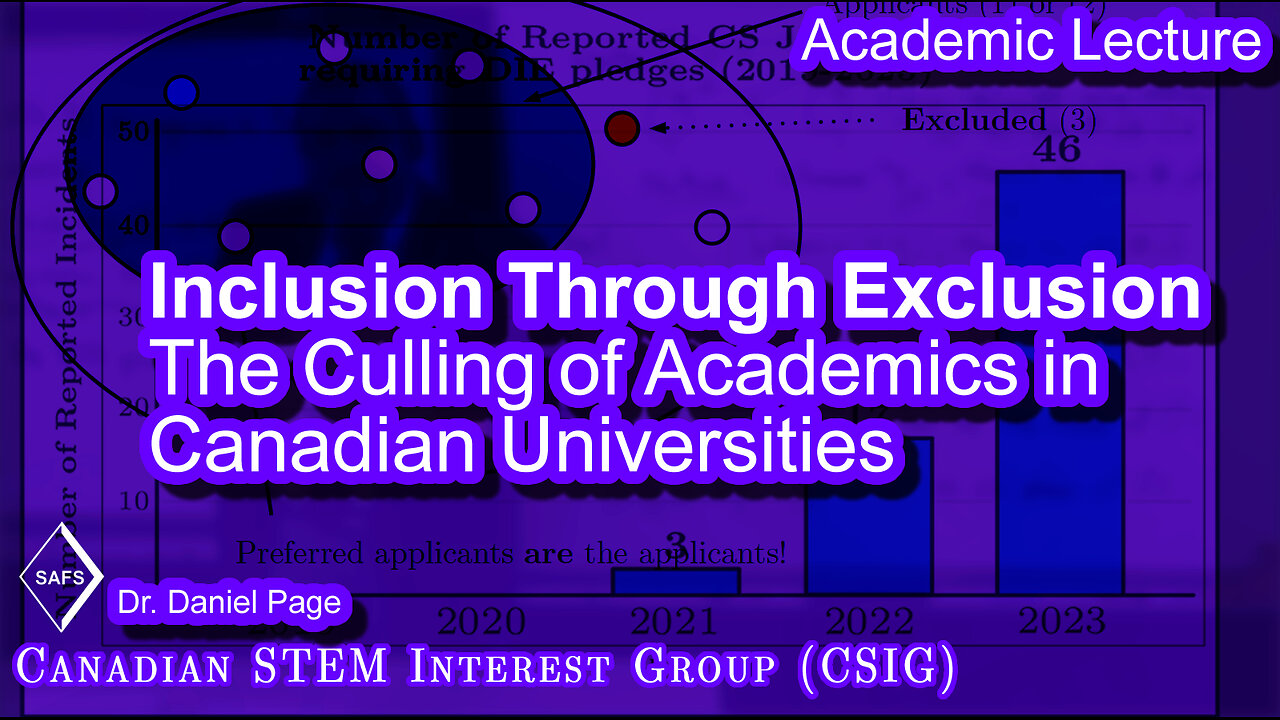Premium Only Content

Inclusion Through Exclusion: The Culling of Academics in Canadian Universities
For the slides, preliminary data sets and more resources: https://pagewizardgames.com/diepledge/
You can find my talk as well on YouTube: https://youtu.be/mtXJVlJ8cAU
We explore the issue of exclusion in academic institutions in Canada, with a focus on Computer Science. Academic culling in our research is the active (intentional or unintentionally) removing of plurality from universities through requiring compelled speech, or placing (new) barriers to academic appointments to serve ideological/political/religious purposes [in this case, so-called "diversity, inclusion, and equity" (DIE)]. Namely, we study a (new) practice that discriminates against academics that do not value or wish to pursue goals of DIE, or academics that abstain on the basis of academic principles/standards.
Our interest in this topic largely came as a result of observing incongruities in our professional experiences in inclusion and those of DIE. There are many grounded and reasoned ways one may disagree with DIE and its methods; whether one agrees or disagrees with DIE, a concerning trend has grown in public Canadian universities of overstepping the boundary of respecting the intellectual autonomy of academics. Have our public universities focused so hard on identity and related political/ideological pursuits, that they have an identity crisis? What does this mean for the next generation of students, our academics, and the future of scientific research in Canada?
We focus on what we call DIE pledges, a term for requiring applicants or academics more broadly give their commitment to DIE in some form: As a job requirement, a statement, or, to participate as an activist. Fundamentally, like other ideological pledges built on non-academic requirements (or even anti-academic requirements, as in this case), pledges such as these are an afront to intellectual autonomy of academics and violate the merit principle.
The following is a preliminary investigation based on our 5+ year study of this topic. We monitored job advertisements posted on CS-Can and other Canadian institutions, that may require a Computer Science PhD. The primary focus was monitoring CS-Can, where job advertisements for faculty positions in Computer Science Departments in Canada are regularly posted. Concerning increases in these practices have occurred.
To the best of our knowledge, our work is the first attempt to document/report this in Canadian STEM fields.
"The State of Academic Freedom in Canada" - https://youtu.be/--ra_fiz0nk
Have a beautiful day!
Supporters (to date of publication, by tier (top to bottom)):
----------------------------------------------------------
Patreon Supporters (General Support):
Draikou
Patreon Supporters (Basic Support):
Eric R
Patreon Supporters (Supporter Access!):
-----------------------------------------------------------
Become a supporter today! To support my work and mission to provide free or accessible Computer Science education (especially in theory), subscribe to the channel, share my videos. Please donate and contribute to support my work for more content:
PATREON: https://www.patreon.com/PageWizard
SUBSCRIBESTAR: https://www.subscribestar.com/drpage
PAYPAL: https://paypal.me/pagewizard
Follow also at:
FACEBOOK: https://www.facebook.com/DanielRPage
TWITTER: https://twitter.com/PageWizardGLE
QUORA: https://www.quora.com/profile/Daniel-R-Page
TWITCH: https://www.twitch.tv/pagewizard
#universities
#stem
#canada
-
 8:10
8:10
WhaddoYouMeme
1 day ago $0.06 earnedChristians, Before You See “Testament”, Watch this!
7.36K4 -
 8:42
8:42
Freedom Frontline
15 hours agoDurbin’s Trump Smear Video Just HUMILIATED Him in the Senate
9.21K4 -
 10:56
10:56
ariellescarcella
12 hours agoThe Shocking Divide Among College Voters Sparks Worry For America
7.57K6 -
 13:09
13:09
Forrest Galante
11 hours agoWildlife Expert Reacts To Deadly Australian Animal TikToks
53.5K9 -
 12:08
12:08
Zoufry
2 days agoThe Mystery of Gaddafi's Final 24 Hours
14.7K11 -
 18:25
18:25
Liberty Hangout
13 days agoAnti-Ice Demonstrators Love Poop!
52.4K71 -
 9:39
9:39
MattMorseTV
17 hours ago $1.14 earnedVance just DROPPED a BOMBSHELL.
45.8K67 -
 23:47
23:47
GritsGG
1 day agoThe Forgotten Best Sniper Support AR!
19.2K3 -
 1:15:48
1:15:48
The Pascal Show
19 hours ago $0.12 earnedMUGSHOTS RELEASED! Emmanuel Haro's Parents Mugshot Released To The Public
14.8K1 -
 14:45
14:45
BlabberingCollector
22 hours agoKings Cross Station SET LEAKS! | Harry Potter HBO Show Update & News
13.7K1